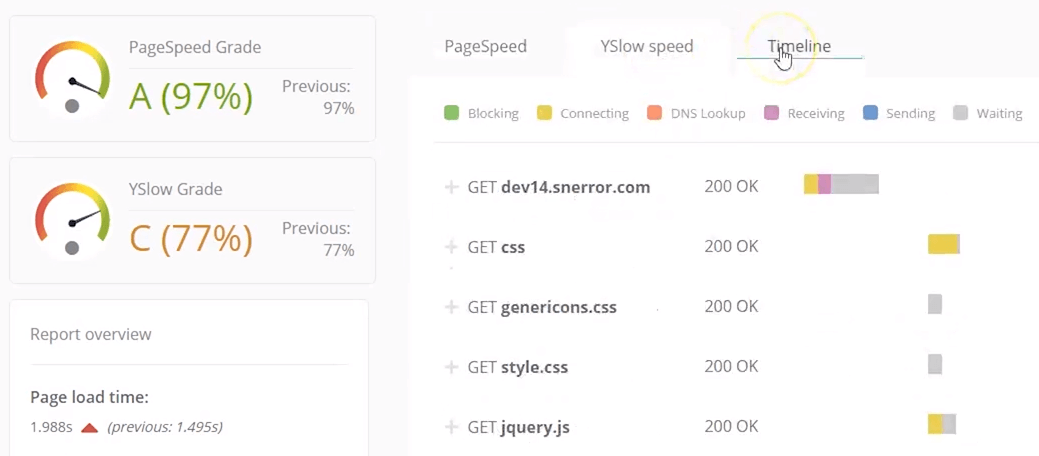Search Engine Optimization (SEO) can involve a lot of work. Not only do you have to optimize your website’s content, but you also need to pay attention to what happens outside of it. If you don’t prioritize ‘off-page SEO’, your site’s rankings may suffer as a result.
Some of the most critical criteria that search engines consider fall under the category of off-page SEO, including backlinks. In other words, you’ll need to pay attention to how your website is represented across the web, if you want to maximize your chances of success.
In this article, we’ll talk a bit more about what off-page SEO is and how it can benefit you. Then we’ll go over five tips for how to manage and improve yours. Let’s get to it!
What Off-Page SEO Is (And Why It’s Important)
Search engines take a lot of factors into consideration when deciding how to rank your website. Most of these, such as optimizing keyword use and titles, fall under the category of ‘on-page SEO’. In other words, they’re actions you perform within your site.
On the other hand, ‘off-page’ (or ‘off-site’) SEO involves signals outside of your website. Backlinks are an example of off-page SEO in action. They’re one of the most important ranking factors, since they let search engines know how much other websites value your content. Yet, they’re not something you have direct control over.
Usually, when people talk about SEO, they’re referring to both on-page and off-page practices. Both types go hand-in-hand, if you want your website to show up on results pages.
But ultimately, whatever you do – make sure that you measure if your changes are making the impact you expected. And what better way to do that than to use ManageWP SEO ranking add-on to keep an eye on the ranking changes of your website.
How to Manage Your Site’s Off-Page SEO (5 Key Tips)
If you’re familiar with the best practices and tools for on-page SEO, you’re off to a great start. Now, let’s look at what falls under the category of off-page SEO, and discuss how to tackle those key tasks.
1. Stay Active on Social Media
You’ve probably noticed that a lot of your favorite brands are highly active on social media. There are several reasons for this. Most importantly, being active on social media maximizes engagement with your current followers, and improves the chances that new members of your target audience will find you.
The relationship between social media and SEO is complicated. However, it’s pretty clear that a strong social presence can have a beneficial effect on your search rankings. What’s more, your social profiles will show up in search results too, as long as they’re well-optimized:

Ideally, you’ll want your site to have a social media presence on multiple platforms that are popular with your audience. To run multiple accounts efficiently, you may need to either hire someone to help out, or use a service such as Buffer to schedule posts in advance:

It can take a while to gain traction on social media, and start seeing the trickle-down effects on your traffic and SEO. So it’s best to get started right away, especially if you haven’t set up accounts for your site yet.
2. Focus on Building Quality Backlinks
When it comes to SEO, backlinks (links to your pages from other sites) are one of the most hotly-debated topics. On one hand, search engines tend to value websites with a lot of backlinks higher than those without. After all, if a lot of sites are linking to yours, then you must be doing something right.
In practice, however, not all backlinks are worth the same. That means your focus should be on building high-quality backlinks, which takes time and patience. You’ll want to:
- Focus on creating highly-engaging content.
- Ask other website owners to include links to your pages.
- Comment on blog posts that have readers who might find your site relevant.
- Look for guest blogging opportunities.
In our experience, the approach that works best is focusing on content creation first, and outreach second. That’s because the more well-established your site is, the easier it becomes to get backlinks. If your content is good enough, people will want to link back to it without much encouragement on your end.
3. Establish Yourself as an Expert in Your Niche
Chances are you follow at least one person online who is an expert in their field. That might mean you keep up with their social media profiles, check up on their site every now and then, and so on.
The great thing about having people look to you as an expert is that they’re more likely to pay attention to what you have to say. Once you establish a track record of publishing quality content, you should start to get a lot more mentions on social media, backlinks, and guest posting opportunities. All of these can help your pages skyrocket to the top of the search rankings.
To put it another way, building up your site’s reputation is a way of improving its outreach potential. In order to get there, you can:
- Engage with your audience constantly, whether that’s through your website or social media.
- Publish well-researched and thorough content consistently.
- Network with other experts in your field.
For example, consider the greater WordPress community. If you frequent our blog, chances are you also follow other excellent WordPress websites, such as WP Tavern. Sites like that become valued resources within a specific niche, by putting out useful and relevant content that speaks to their target audiences.
4. Experiment With Different Types of Content
Most websites tend to rely on a single type of content. Consider blogs, for example, which are all about text:

Focusing on your strengths isn’t a bad thing. However, it’s important to understand that not everyone wants to digest content in the same way. As popular as online articles are with certain audiences, other people prefer video, infographics, or podcasts (just to name a few).
This means that by producing different types of content for your website, you can reach more people than you otherwise might. What’s more, visual content in particular is excellent for improving your SEO, both on and off your site.
Of course, putting together effective videos and infographics isn’t easy. However, you can always try your hand with different formats using content you’ve already created. Let’s say, for example, that you’ve written a blog post about website automation. Here are three ways you might repurpose that content for a new audience:
- Put together a video tutorial using screen recordings, with voiceover narration.
- Create an infographic using a free, beginner-friendly tool such as Canva.
- Record yourself discussing the topic with other experts, in a podcast format.
These strategies aren’t just valuable on your site – they also give you the opportunity to get more backlinks. Engaging infographics tend to get shared a lot, and the same is true for other types of visual content. You can also post this content outside your site in order to boost your off-page SEO directly, such as by sharing images on social media and posting videos to YouTube.
5. Improve Your Website’s Performance
Nobody likes a slow website, which is why pages that take too long to load tend to get less engagement and traffic. Another major downside is that other sites might not want to link to you at all, if they find your pages too slow. Naturally, that can hinder your other off-page SEO efforts.
The best way to avoid this issue is to keep an eye on your site’s performance at all times. That way, you’ll notice if your page loading times start creeping up, and you can fix the problem before it begins to affect your SEO.
There are a lot of ways to monitor your site’s performance. For example, you can use our own Performance Check tool, which grades your website on several key factors:

The free version of this tool enables you to run tests manually whenever you want. If you’re a premium user, you can schedule them in advance, so you don’t miss any changes.
Most importantly, the Performance Checker provides you with advice on how to improve your site’s speed. If you put those tips into action, you should be able to improve both performance and SEO in no time.
Conclusion
If you want search engines to favor your site, you need to start by optimizing your content to get their attention. However, you’ll also have to put some effort into off-page SEO, if you want your website to rise through the rankings more quickly.
Fortunately, improving your off-page SEO isn’t as hard as you might imagine. Here are five of the best ways to do it:
- Stay active on social media.
- Focus on building quality backlinks.
- Establish yourself as an expert in your niche.
- Experiment with different types of content.
- Improve your website’s performance.
Do you have any questions about how to tackle off-page SEO? Let’s talk about them in the comments section below!
Image credit: Pixabay.

Leave a Reply